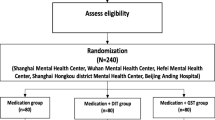Abstract
In this article, we will introduce interpersonal psychotherapy as an effective short-term treatment strategy in major depression. In IPT, a reciprocal relationship between interpersonal problems and depressive symptoms is regarded as important in the onset and as a maintaining factor of depressive disorders. Therefore, interpersonal problems are the main therapeutic targets of this approach. Four interpersonal problem areas are defined, which include interpersonal role disputes, role transitions, complicated bereavement, and interpersonal deficits. Patients are helped to break the interactions between depressive symptoms and their individual interpersonal difficulties. The goals are to achieve a reduction in depressive symptoms and an improvement in interpersonal functioning through improved communication, expression of affect, and proactive engagement with the current interpersonal network. The efficacy of this focused and structured psychotherapy in the treatment of acute unipolar major depressive disorder is summarized. This article outlines the background of interpersonal psychotherapy, the process of therapy, efficacy, and the expansion of the evidence base to different subgroups of depressed patients.


Similar content being viewed by others
References
Ainsworth MDS, Bowlby J (1991) An ethological approach to personality development. Am Psychol 46:331–341
Cuijpers P, Geraedts AS, van Oppen P, Markowitz JC, van Straten A (2011) Interpersonal psychotherapy for depression: a meta-analysis. Am J Psychiatry 168(6):581–592
DGPPN, BÄK, KBV, AWMF, AkdÄ, BPtK, BApK, DAGSHG, DEGAM, DGPM, DGPs, DGRW (Hrsg) für die Leitliniengruppe Unipolare Depression (2009) S3-Leitlinie/Nationale VersorgungsLeitlinie Unipolare Depression—Langfassung, 1. Auflage. DGPPN, ÄZQ, AWMF, Berlin, Düsseldorf
Elkin I, Shea T, Watkins JT, Imber ST, Sotsky SM, Collins JF, Glass DR, Pilkonis PA, Leber WR, Docherty JP, Fiester SJ, Parloff MB (1989) National institute of mental health treatment of depression collaborative research program general effectiveness of treatments. Arch Gen Psychiatry 46:971–982
Frank E, Kupfer DJ, Wagner EF, McEachran AB, Cornes C (1991) Efficacy of interpersonal psychotherapy as a maintenance treatment of recurrent depression contributing factors. Arch Gen Psychiatry 48:1053–1059
Hollon SD, Jarrett RB, Nierenberg AA, Thase ME, Trivedi M, Rush AJ (2005) Psychotherapy and medication in the treatment of adult and geriatric depression: which monotherapy or combined treatment? J Clin Psychiatry 66:455–468
Klerman GL, Weissman M, Rounsaville BJ, Chevron ES (1984) Interpersonal psychotherapy of depression. Basic Books, New York
Markowitz JC, Weissman MM (1995) Interpersonal psychotherapy. In: Beckham EE, Leber WR (eds) Handbook of depression 2nd ed. The Guildford Press, New York, pp 376-390
Meyer A (1957) Psychobiology. Springfield, Illinois, Charles C Thomas
National Institute for Health and Clinical Excellence: Guidance (2010) Depression: the treatment and management of depression in adults (updated edition). British Psychological Society, Leicester (UK)
Schramm E, van Calker D, Dykierek P, Lieb K, Kech S, Zobel I, Leonhart R, Berger M (2007) An intensive treatment program of interpersonal psychotherapy plus pharmacotherapy for depressed inpatients: acute and long-term results. Am J Psychiatry 164:768–777
Schramm E (2010) Interpersonelle Psychotherapie. Mit dem Original-Therapiemanual von Klerman, Weissman, Rounsaville und Chevron. 3. Auflage. Schattauer GmbH, Stuttgart
Schramm E, Zobel I, Dykierek P, Kech S, Brakemeier EL, Külz A, Berger M (2011) Cognitive behavioral analysis system of psychotherapy versus interpersonal psychotherapy for early-onset chronic depression: a randomized pilot study. J Affect Disord 129:109–116
Shear K, Frank E, Houck PR, Reynolds CF 3rd (2005) Treatment of complicated grief: a randomized controlled trial. JAMA 293:2601–2608
Sullivan HS (1953) The interpersonal theory of psychiatry. Norton, New York
Weissman MM, Markowitz JC, Klerman GL (2007) Clinician’s quick guide to interpersonal psychotherapy. Oxford University Press, New York
Weissman M, Markowitz J, Klerman G (deutsche Einleitung und Herausgabe von A. Maercker) (2009) Interpersonelle Psychotherapie. Ein Behandlungsleitfaden. Hogrefe, Göttingen
Acknowledgments
This article is part of the supplement “Personalized Psychiatry and Psychotherapy.” This supplement was not sponsored by outside commercial interests. It was funded by the German Association for Psychiatry and Psychotherapy (DGPPN).
Conflict of interest
The authors declare that they have no conflict of interest.
Author information
Authors and Affiliations
Corresponding author
Rights and permissions
About this article
Cite this article
Brakemeier, EL., Frase, L. Interpersonal psychotherapy (IPT) in major depressive disorder. Eur Arch Psychiatry Clin Neurosci 262 (Suppl 2), 117–121 (2012). https://doi.org/10.1007/s00406-012-0357-0
Received:
Accepted:
Published:
Issue Date:
DOI: https://doi.org/10.1007/s00406-012-0357-0




